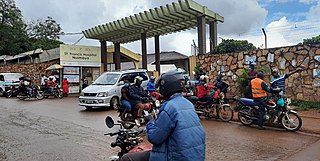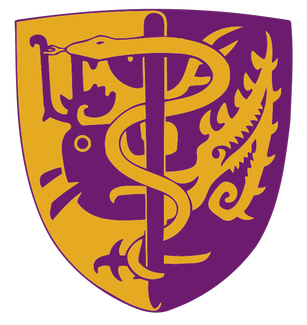Related Research Articles
A medical school is a tertiary educational institution, professional school, or forms a part of such an institution, that teaches medicine, and awards a professional degree for physicians. Such medical degrees include the Bachelor of Medicine, Bachelor of Surgery, Master of Medicine, Doctor of Medicine (MD), or Doctor of Osteopathic Medicine (DO). Many medical schools offer additional degrees, such as a Doctor of Philosophy (PhD), master's degree (MSc) or other post-secondary education.
A Bachelor of Medicine, Bachelor of Surgery is an undergraduate medical degree awarded by medical schools in countries that follow the tradition of the United Kingdom. The historical degree nomenclature states that they are two separate undergraduate degrees. In practice, however, they are usually combined as one and conferred together, and may also be awarded at graduate-level medical schools. It usually takes five to six years to complete this degree.

Emmanuel Amey Ojara, MBChB, MMed Surgery, was a medical doctor, surgeon, and oncologist in East Africa. At the time of his death, he was a senior lecturer at the University of Nairobi, School of Medicine.

St. Francis Hospital Nsambya, commonly known as Nsambya Hospital, is a hospital in Kampala, the capital of Uganda and the largest city in that country.
Master of Medicine (MMed) is a postgraduate professional clinical degree awarded by medical schools to physicians following a period of instruction, supervised clinical rotations, and examination. The degree usually takes three years to complete, but may take up to four years in some countries. It is awarded by both surgical and medical subspecialties and usually includes a dissertation component. The degree may complement an existing fellowship in the chosen specialty or be the sole qualification necessary for registration as a specialist.
The Makerere University School of Medicine (MUSM), also known as the Makerere University Medical School, is the school of medicine of Makerere University, Uganda's oldest and largest public university. The medical school has been part of Makerere University since 1924. The school provides medical education at diploma, undergraduate, and postgraduate levels.
Makerere University School of Public Health (MUSPH) is one of the schools that comprise the Makerere University College of Health Sciences, a constituent college of Makerere University, Uganda's oldest and largest public university.
Makerere University College of Health Sciences (MakCHS) is a constituent college of Makerere University, Uganda's oldest university. The schools of the college offer undergraduate and postgraduate courses in the biomedical sciences, health sciences, human medicine and public health, covering a broad range of disciplines and specialties.
Makerere University College of Health Sciences (MakCHS), is one of the 10 colleges that constitute Makerere University, East Africa,s oldest university. The college was established in 2007 by consolidating the training offered by the University in the disciplines of Medicine, Dentistry, Pharmacy, Nursing, Public Health, Optometry, Radiography and other health sciences. The college of Health Sciences consists of 5 schools: School of Medicine, School of Public Health, School of Biomedical Sciences, School of Dentistry and School og Health Sciences. The college provides training in the health sciences at the undergraduate, masters, PhD and post- doctoral levels levels.
Nelson Kawulukusi Sewankambo, MBChB, MMed, MSc, FRCP, LLD (Hon), sometimes spelled as Nelson Ssewankambo, is a Ugandan physician, academician, medical researcher, and medical administrator. He is a professor of medicine and former principal of the Makerere University College of Health Sciences, a semi-autonomous constituent college of Makerere University.
As of 2021, 11 universities in Uganda offer medical schools. Admission to medical school requires the candidate to have attained a Uganda Advanced Certificate of Education (UACE) as well as proficiency in Biology or Zoology, Chemistry and Physics at A-level standards. Training leading to the degree of Bachelor of Medicine and Bachelor of Surgery (MBChB) lasts five years. Major examinations are conducted after the first, second and fifth year, with additional evaluations after each clinical rotation. After successful completion of the fifth year, candidates complete a year of internship under the supervision of specialists. Postgraduate training is available at Makerere University School of Medicine in a number of medical and surgical disciplines. The training takes three years and leads to the Master of Medicine (MMed) degree.
Butabika National Referral Hospital, commonly known as Butabika Hospital is a hospital in Kampala, Uganda's capital and largest city. It is the mental health national referral hospital for the entire country's estimated population of 36 million in 2014.
Professor Charles Mark Lwanga Olweny, MBChB, MMed, MD, FRACP, is a Ugandan physician, oncologist, academic and medical researcher. Currently he is a professor of medicine and Immediate past vice-chancellor at Uganda Martyrs University, based at Nkozi, Mpigi District, in Central Uganda.
Uganda Martyrs University School of Medicine (UMUSM), whose official name is Mother Kevin Postgraduate Medical School (MKPMS), is the school of medicine of Uganda Martyrs University. As of June 2014, the medical school is the newest medical school in Uganda, having been established in 2010. Currently the school provides postgraduate medical education in the disciplines of Pediatrics, Internal Medicine, Surgery, Obstetrics/Gynecology and Emergency Medicine.
Kampala International University School of Health Sciences is the school of health sciences of Kampala International University, a private Ugandan university. The school provides health sciences education at the diploma, undergraduate and postgraduate levels.

Faculty of Medicine of The Chinese University of Hong Kong (CUHK) (Chinese: 香港中文大學醫學院) was established in 1981 and consists of five schools which offer an array of undergraduate and postgraduate programmes in the field of medicine, nursing, pharmacy and public health. The Hong Kong's Prince of Wales Hospital is the faculty's teaching facility and base of research. The medium of instruction of all programs is English while Chinese is also retained for the teaching of Chinese Medicine.

The Busitema University Faculty of Health Sciences (BUFHS), also known as the Busitema University Medical School (BUMS) and the Busitema University School of Medicine (BUSM), is the school of medicine of Busitema University, one of Uganda's public universities. The medical school is one of the newer medical schools in the country, having been part of university since 2013. The school provides medical education at undergraduate and postgraduate levels.
Habib Medical School (HMS) is the school of medicine of the Islamic University in Uganda (IUIU), one of Uganda's private universities. The school is the newest medical school in the country, having been part of IUIU since 2014. The school provides medical education at diploma and undergraduate levels.
Dr Lawrence Kazibwe is a consultant obstetrician and gynecologist in the Uganda Ministry of Health. He is the deputy executive director of Kawempe General Hospital, in Kawempe Division, in northern Kampala, the capital and largest of Uganda. He was appointed to that position on 9th August 2018.
Pauline Byakika–Kibwika, is a Ugandan specialist physician, internist, epidemiologist, academic and researcher, who serves as an Associate Professor of Medicine at Makerere University College of Health Sciences. From 2017 until 2019, she served as the Vice President of the Uganda Medical Association, a professional industry association, that champions medical doctors' interests in the county.
References
- ↑ "Gulu University In Bumper Pioneer Doctors Harvest". The Observer (Uganda) . 24 January 2010. Retrieved 26 December 2014.
- ↑ "Distance Between Kampala And Gulu With Map". Globefeed.com. Retrieved 10 June 2014.
- ↑ "Location of Gulu Medical School At Google Maps". Google Maps . Retrieved 10 June 2014.
- ↑ Lacor, Hospital. "Collaboration With Gulu University". St. Mary's Hospital Lacor . Retrieved 10 June 2014.
- ↑ Amoru, Paul (22 January 2010). "Gulu University to Pass Out Its First Doctors". Daily Monitor (Kampala). Retrieved 10 June 2014.
- ↑ Makumbi, Cissy (13 February 2012). "Gulu University Starts Pharmacy Programme". Daily Monitor Mobile . Retrieved 10 June 2014.
